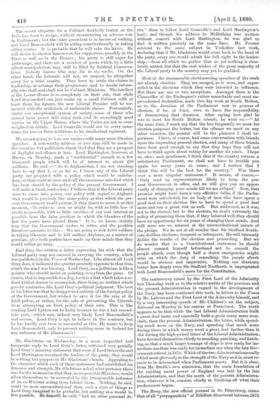Most of the innumerable electioneering speeches of the week are
already obsolete. They are merged, as it were, and super- seded in the elections which they were intended to influence. But there are one or two exceptions. Amongst them is the Chancellor of the Exchequer's rather remarkable and most un- precedented declaration, made this day week at South Molten, as to the duration of the Parliament now in process of election, if he, at least, were to have the responsibility of determining that duration. After saying how glad he was to meet his South Molten friends, he went on :—" At the same time, I must say that the less frequently we meet for- election purposes the better, but the oftener we meet on any other occasion, the greater will be the pleasure I shall ex- perience. I have, of course, had some conversation with friends upon the impending general election, and many of these friends have been good enough to say that they hope they will not have to think again about voting for another six years. I hope so, also ; and, gentlemen, I think that if the country returns a satisfactory Parliament, we shall not have to trouble you again for many years to come ; and I confess that I think this will be the best for the country." Was there ever a more singular statement P It means, of course,— ' Only send up representatives likely to keep the pre- sent Government in office, and we will give you no oppor- tunity of changing your minds till we are obliged.' Now, that promise might have been a very effective bribe, if the Parlia- ment were self-elected, for no body of men who have spent a good deal on their election like to have to spend a good deal more and run a great risk as well. But addressed, as it was,. not to the elected, but to the electors, we doubt extremely the policy of promising them that, if they behaved well, they should. have no opportunity for six years of changing their minds. And_ still more are we amazed at the unconstitutional nature of the pledge. We do not at all wonder that Sir Stafford North- cote dislikes elections, frequent or infrequent. He will intensely dislike the results of the election now proceeding. But we do wonder that as a Constitutional statesman he should almost commit himself beforehand not to consult the- people afresh, even though half a dozen emergencies might arise on which the duty of consulting the people afresh would be obvious and imperative. Nothing can illustrate better how deeply even Sir Stafford Northcote is impregnated. with Lord Beaconsfield's scorn for the Constitution.


































 Previous page
Previous page